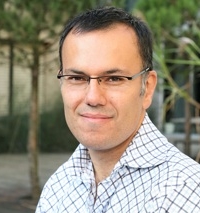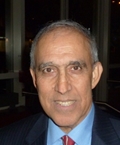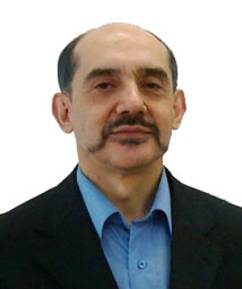سخنرانان کلیدی
سخرانی روز اول کنفرانس (91/12/22)
 |
عنوان سخنرانی: BigData and Dark Silicon: Taming Two IT Inflection Points on a Collision Course
سخنران: دکتر بابک فلسفی، استاد دانشگاه Ecole Polytechnique Federale de Lausanne
|
|
چکیده سخنرانی
|
Information technology is now an indispensable pillar of a modern-day society, thanks to the proliferation of digital platforms in the past several decades. We are now witnessing two inflection points, however, that are about to change IT as we know it. First, we are entering the BigData or the Data Deluge era where demand on robust and economical data processing, communication and storage is growing faster than technology can sustain. Second, while forecasts indicate that chip density scaling will continue for another decade, the diminishing returns in supply voltage scaling and the impending "energy wall", is leading server designers towards energy-centric solutions and eventually Dark Silicon. In this talk, I will motivate these two IT trends and present promising research avenues to bridge the gap between BigData IT resource demands and energy efficiency of server platforms.
|
|
بیوگرافی سخنران
|
Babak is Professor in the School of Computer and Communication Sciences and the founding director of the EcoCloud research center pioneering future energy-efficient and environmentally-friendly cloud technologies at EPFL. He has made numerous contributions to computer system design and evaluation including a scalable multiprocessor architecture which was prototyped by Sun Microsystems (now Oracle), snoop filters that are incorporated into IBM BlueGene/P, and computer system simulation sampling methodologies that are in use by AMD and HP for research and product development. His most notable contribution has been to be first to show that contrary to conventional wisdom, multiprocessor memory programming models -- known as memory consistency models -- prevalent in all modern systems are neither necessary nor sufficient to achieve high performance. He is a recipient of an NSF CAREER award, IBM Faculty Partnership Awards, and an Alfred P. Sloan Research Fellowship. He is also a fellow of IEEE. |
سخرانی روز دوم کنفرانس (91/12/22)
 |
عنوان سخنرانی: SYSTEM OF SYSTEMS ENGINEERING – Innovation and Challenges for 21st Century
سخنران: دکتر محمد جمشیدی، استاد دانشگاه Texas,San Antoni
|
|
چکیده سخنرانی
|
Systems engineering is at a crossroad now at this early part of the 21st Century. One of the main challenges of any paradigms in systems engineering is being able to handle complex systems under unforeseen uncertainties. A system may be called complex if its dimension (order) is too high and its model (if available) is nonlinear, interconnected, and information on the system is uncertain such that classical techniques cannot easily handle the problem. A system of systems (SoS) is a “super system,” or an integration of complex systems coordinated together in such a way to achieve a wider goal with possible higher significance. Applications of SoS are quite extensive – examples are future combat mission, Global Warming, Mars missions, Air Traffic System, Global Earth Observation System, Smart Electric Power Grid, Energy systems, healthcare system, Big Data Analytics, etc. Computational intelligence (CI) or Soft Computing, a consortium of fuzzy logic (approximate reasoning), neuro-computing (learning), genetic algorithms and genetic programming (optimization), has proven to be a powerful set of tools for adding autonomy and semi-autonomy to many complex systems. For such systems the size of autonomous controller architecture will be nearly infinite. In this lecture cyber-physical or system of systems are introduced, challenges are brought up and potential solutions and needs are discussed. Special emphasis will be made on applications of land rovers (vehicles), underwater rovers and unmanned aerial rovers (vehicles). Simulated and experimental results will be presented. Research at the University of Texas ACE Laboratory on robotic swarms, energy management and forecasting, etc. will be covered. |
|
بیوگرافی سخنران
|
Mo M. Jamshidi (Fellow IEEE, Fellow ASME, Fellow AAAS, Fellow TWAS, Fellow NYAS, A. Fellow-AIAA, A. Fellow HAE) received BS in EE, Oregon State University, Corvallis, OR, USA in 1967, the MS and Ph.D. degrees in EE from the University of Illinois at Urbana-Champaign, IL, USA in June 1969 and February 1971, respectively. He holds honorary doctorate degrees from University of Waterloo, Canada, 2004 and Technical University of Crete, Greece, 2004. Currently, he is the Lutcher Brown Endowed Chaired Professor of the University of Texas Systems and working at the University of Texas, San Antonio, TX, USA. He has also been the founding Director of Center for Autonomous Control Engineering (ACE – ace.utsa.edu ) at the University of New Mexico in 1995, and has moved the Center to University of Texas, San Antonio in 2006. He was a Senior Research Advisor at US Air Force Research Laboratory, KAFB, NM from 2002-2005 and 1984-1990. He was also a consultant with US Department of Energy Office of Industrial Technologies and DOE Laboratories Oak Ridge, Sandia and Los Alamos. He was also an advisor for the NASA Headquarters from 1998-2004 and on NASA JPL's Pathfinder Project mission and Surface Systems Track Review Board. He has worked in various academic and industrial positions at various national and international locations including with IBM and GM Corporations. In 1999, he was a NATO Distinguished Professor in Portugal conducting lectures on intelligent systems and control. During 1994-95 he was a Directeur du Recherch Associe’ due CNRS working at LAAS and University of Toulouse, Toulouse, France. In 2008 he was chosen as Royal Academy of Engineering Visiting Fellow in UK. He has over 650 technical publications including 64 books (12 text books), research volumes, and edited volumes. His most recent edited books are on system of systems engineering. Six of his books have been translated into at least one foreign language. He is or has been the Founding Editor or co-founding editor or Editor-in-Chief of 5 journals including IEEE Control Systems Magazine, the IEEE Systems Journal and Intelligent Automation and Soft Computing (AutoSoft) Journal. Dr. Jamshidi is a Fellow or member of 8 societies and academies. He is the recipient of the IEEE Centennial Medal and IEEE Control Systems Society Distinguished Member Award and the IEEE CSS Millennium Award. He was on the Board of Governors of the IEEE Society on Systems, Man and Cybernetics (2 terms) and currently board member of the IEEE Systems Council. He is an Honorary Professor at 6 Universities in China (Xian, Nanjing and East China Normal), UK (Birmingham), Hungary (Obuda) and Australian (Deakin). In October 2005 he was awarded the IEEE’s Norbert Weiner Research Achievement Award. In April 2010 at the IEEE Systems Conference, one of his works on robotic swarm received the Best Paper Award among 140 papers in San Diego, CA. |
سخرانی روز سوم کنفرانس (91/12/24)
 |
عنوان سخنرانی: پردازش دیدگاه نگر مفاهیم: چارچوب رایانشی پیشرفته برای فعالیتهای استدلالی
سخنران: دکتر کامبیز بدیع، مرکز تحقیقات مخابرات ایران
|
|
چکیده سخنرانی
|
In daily cognitive tasks, it happens quite frequently that one needs to process a conceptual issue from the viewpoint of another one. Within this context, provided that each conceptual issue has its own particular attributes, a process of matching should be performed to show how one conceptual issue may make sense from the viewpoint of the other. In this speech, having reviewed the basic idea of such a process together with its essential mechanism, it will be discussed how viewpoint-oriented processing can be regarded as an advanced computational framework for reasoning type activities such as: “argumentation”, “explanation”, “justification”, and “interpretation” as well.
|
|
بیوگرافی سخنران
|
كامبیز بدیع فارغ التحصیل دبیرستان البرز بوده و درجات كارشناسی، كارشناسی ارشد و دكترای خود را در زمینه مهندسی برق باگرایش بازشناسی الگو از انستیتو تكنولوژی توكیو دریافت نموده است. نامبرده از بدو بازگشت به ایران در مركز تحقیقات مخابرات ایران (پژوهشگاه فضای مجازی كنونی) مشغول به فعالیت پژوهشی بوده است. اهم فعالیتهای پژوهشی نامبرده، یادگیری ماشین (ML) و مدلسازی شناختی به طور اعم، و مدلسازی رایانشی فرآیندهای تمثیلی، فرآیندهای تفسیری و فرایندهای مبتنی بر تجربه به طور اخص، با تاكید بر مقاصدی از قبیل سازماندهی بهینه متون و محتوا در فضای مجازی و راهبری پژوهش و پدیدآوردن رایانه ای ایده ها و تكنیكهای نوین می باشد. به ویژه تحقیقات اخیر نامبرده در ارتباط با ایده زایی و محتواسازی خودكاربرای سازمانهای هوشمند، که مبتنی بر رویکرد تفسیری به تمثیل و ترکیب مفاهیم است، در خور توجه می باشد.
نامبرده، یكی از مشوقین و ترغیب كنندگان پژوهش های میان گستره ای در حوزه علوم رایانشی و شناختی در ایران بوده و بخش قابل ملاحظه ای از كتب و مقالات تالیفی او حكایت از این امر دارد. در این ارتباط، نامبرده ادیتور كتابی تحت عنوان ”پردازش تفسیری و برازش محیطی“ (Interpretative Processing and Environmental Fitting) است، كه بر مبنای سمپوزیوم IPEF (برگزارشده در IPM )، به چاپ رسیده است و نیز سر مولف کتاب "خوشه بندی" (Clustering) (انتشاریافته توسط مرکز تحقیقات مخابرات ایران) و کتاب "بیگانه یابی: طرحواره ای جدید در پردازش دانش و تولید دانش"(Strangification: A New Paradigm in Knowledge Processing & Creation) (انتشار یافته توسط انتشارات PeterLang ) می باشد. |
|
|